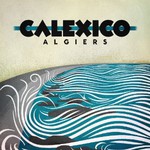Algiers
Studio Album by Calexico released in 2012Algiers review
Calexico changed a studio
The Calexico sextet has explored vast musical areas in the fifteen years that this Arizona-based ensemble has spent on stage. The list of genres the Americans used to and still work with could take too much space, but the names and definitions do not matter after you get to listen to what this extraordinary band manages to produce. After album number six released in 2008, Calexico decided it was time to take a break in studio activities, engaged in other projects, including scoring for films. Surprisingly for many, after this hiatus, the ensemble relocated from the mother ground of Arizona to New Orleans to record the new long player. By the way, the fresh product is called Algiers, but there is no connection with Africa at all. It took its title from the region where it was prepared. As the musicians said, the change of surroundings gave a good boost to their song writing, and a lot of the songs off this album were created under the impression of the environment where the band was working.
Lower tempo, deeper thought
Algiers was no exception in the sense that Calexico presented the album as another long and complex journey across boundaries of many a style, as usual, demonstrating a top notch craftsmanship. After the opening Epic sounding up to its title and rhythmic Splitter with lavishing horns, the ensemble steps into blues and brings one of the record’s highlights, Sinner In The Sea. And after the final chords of the amazing ballad Para, a conclusion comes automatically that Calexico’s new CD turns out to be quite serious and, at times, even depressive, with music leaning towards dragging rhythms and lulling sounds of instruments. Most of the Algiers songs build on a medium tempo and somehow stripped down acoustics, which means the vocals become even more important as shown by Better And Better, and Maybe On Monday. It would seem that the record walks moderately to its end, but it is closed by an unpredictably more complex and colorful track called The Vanishing Light, which must bring the slumbering listener back to alertness.
Calexico still have no similar albums
Algiers is the illustration of quality beating quantity. Already experienced musicians, Calexico guitarists prefer elegant and sophisticated play with soft plucking and precise solos to loud and intense riffs. It gives an opportunity for attentive listeners to find behind the instruments something personal and moving that the performers wanted to share. And this is why the whole album is filled with a sensation of mystery and secrecy. What makes it even more exquisite is a couple of songs in Spanish, No Te Vayas, and Puerto, so different musically: thick guitars of the former against light dance electronic of the latter. When it comes to emotional level, Algiers reminds most of the 2006 effort called Garden Ruin, yet it is softer and calmer. The members of Calexico explain this referring to a powerful impact they feel under in the unique atmosphere of New Orleans, and, in particular, in the reconstructed church building where they resided during the work on the album. However, one should abstain from asking if this record is better or worse than those the band already has in the discography. Calexico are one of those performers whose albums are so unlike that comparing them is meaningless.

